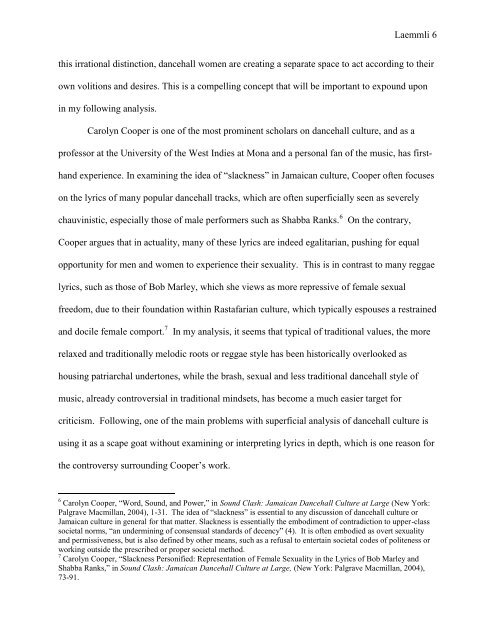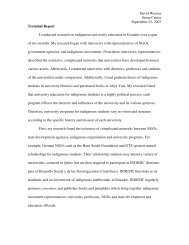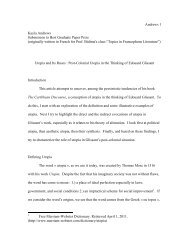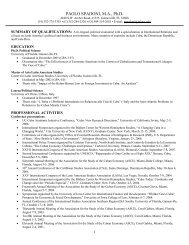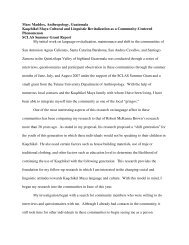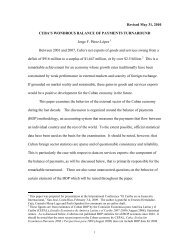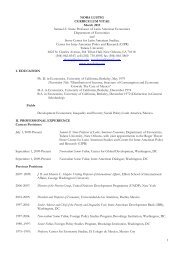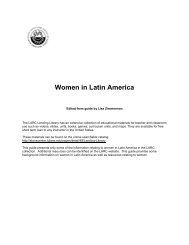Dancehall Queens and the Sale of Female Empowerment
Dancehall Queens and the Sale of Female Empowerment
Dancehall Queens and the Sale of Female Empowerment
You also want an ePaper? Increase the reach of your titles
YUMPU automatically turns print PDFs into web optimized ePapers that Google loves.
Laemmli 6<br />
this irrational distinction, dancehall women are creating a separate space to act according to <strong>the</strong>ir<br />
own volitions <strong>and</strong> desires. This is a compelling concept that will be important to expound upon<br />
in my following analysis.<br />
Carolyn Cooper is one <strong>of</strong> <strong>the</strong> most prominent scholars on dancehall culture, <strong>and</strong> as a<br />
pr<strong>of</strong>essor at <strong>the</strong> University <strong>of</strong> <strong>the</strong> West Indies at Mona <strong>and</strong> a personal fan <strong>of</strong> <strong>the</strong> music, has firsth<strong>and</strong><br />
experience. In examining <strong>the</strong> idea <strong>of</strong> “slackness” in Jamaican culture, Cooper <strong>of</strong>ten focuses<br />
on <strong>the</strong> lyrics <strong>of</strong> many popular dancehall tracks, which are <strong>of</strong>ten superficially seen as severely<br />
chauvinistic, especially those <strong>of</strong> male performers such as Shabba Ranks. 6<br />
On <strong>the</strong> contrary,<br />
Cooper argues that in actuality, many <strong>of</strong> <strong>the</strong>se lyrics are indeed egalitarian, pushing for equal<br />
opportunity for men <strong>and</strong> women to experience <strong>the</strong>ir sexuality. This is in contrast to many reggae<br />
lyrics, such as those <strong>of</strong> Bob Marley, which she views as more repressive <strong>of</strong> female sexual<br />
freedom, due to <strong>the</strong>ir foundation within Rastafarian culture, which typically espouses a restrained<br />
<strong>and</strong> docile female comport. 7<br />
In my analysis, it seems that typical <strong>of</strong> traditional values, <strong>the</strong> more<br />
relaxed <strong>and</strong> traditionally melodic roots or reggae style has been historically overlooked as<br />
housing patriarchal undertones, while <strong>the</strong> brash, sexual <strong>and</strong> less traditional dancehall style <strong>of</strong><br />
music, already controversial in traditional mindsets, has become a much easier target for<br />
criticism. Following, one <strong>of</strong> <strong>the</strong> main problems with superficial analysis <strong>of</strong> dancehall culture is<br />
using it as a scape goat without examining or interpreting lyrics in depth, which is one reason for<br />
<strong>the</strong> controversy surrounding Cooper’s work.<br />
6 Carolyn Cooper, “Word, Sound, <strong>and</strong> Power,” in Sound Clash: Jamaican <strong>Dancehall</strong> Culture at Large (New York:<br />
Palgrave Macmillan, 2004), 1-31. The idea <strong>of</strong> “slackness” is essential to any discussion <strong>of</strong> dancehall culture or<br />
Jamaican culture in general for that matter. Slackness is essentially <strong>the</strong> embodiment <strong>of</strong> contradiction to upper-class<br />
societal norms, “an undermining <strong>of</strong> consensual st<strong>and</strong>ards <strong>of</strong> decency” (4). It is <strong>of</strong>ten embodied as overt sexuality<br />
<strong>and</strong> permissiveness, but is also defined by o<strong>the</strong>r means, such as a refusal to entertain societal codes <strong>of</strong> politeness or<br />
working outside <strong>the</strong> prescribed or proper societal method.<br />
7 Carolyn Cooper, “Slackness Personified: Representation <strong>of</strong> <strong>Female</strong> Sexuality in <strong>the</strong> Lyrics <strong>of</strong> Bob Marley <strong>and</strong><br />
Shabba Ranks,” in Sound Clash: Jamaican <strong>Dancehall</strong> Culture at Large, (New York: Palgrave Macmillan, 2004),<br />
73-91.


